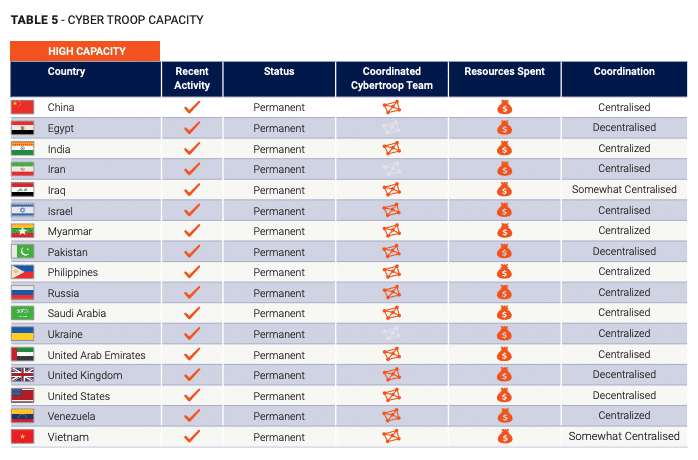New report identifies 81 countries using social media to spread disinformation
Justin Hendrix / Jan 19, 2021Oxford Internet Institute identifies 41 private firms selling propaganda as a service
A new report from the Computational Propaganda Research Project at the Oxford Internet Institute- the latests installment in what has become an important annual survey of disinformation tactics across the world- identifies disinformation and propaganda activity in 81 countries, from Angola to Zimbabwe. Key findings of the report include:
- States and other political actors continue to experiment and refine strategies and tactics to deploy propaganda and disinformation on social media to "disrupt elections, democracy and human rights."
- The number of "takedowns" of accounts related to such activity- what appears to be the main tactic of social media platforms to contend with such activity- has continued to increase. The report tallies hundreds of thousands of accounts removed across Facebook, Twitter and Instagram- a fraction, it should be noted, of the false and fraudulent accounts known to exist on these sites.
- The authors find 41 private firms operating in 48 countries, tallying at least $60 million in verifiable spending on computational propaganda firms.
- 57 countries are documented using automated accounts for propaganda purposes, while 79 are known to use human-curated accounts. 14 countries have "used hacked, stolen or impersonation accounts".
- Of the key tactics described, it is notable that 73% of study countries have employed trolling and harassment in order to suppress participation. One notable example from Guatemala related to the intimidation of journalists.
The report looks at the organization and resources given to propaganda activities and ranks nations according to their capacities. 17 state actors are identified as "high capacity":

While the report's authors find that computational propaganda is now a "mainstay in public life," they note this is a choice. "It is the result of poor technology design choices, lax public policy oversight, inaction by the leadership of social media platforms, investments by authoritarian governments, political parties, and mainstream communications firms. Computational propaganda is also a driver of further democratic ills, including political polarization and diminished public trust in democratic institutions."
Authors
